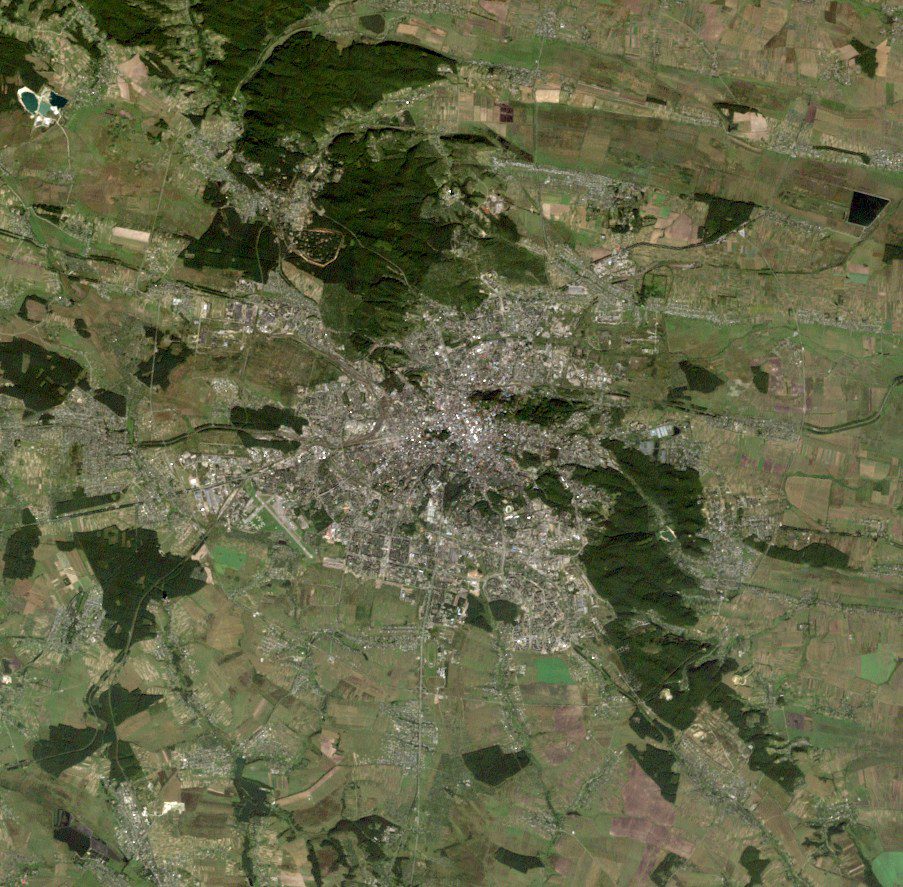Yale researchers use satellite images to locate detention camps in Russian-occupied Ukraine
The Yale School of Public Health’s Humanitarian Research Lab’s collaboration with the U.S. State Department is set to be discussed at the UN Security Council next Tuesday.

Wikimedia Commons
Yale affiliates have located 21 sites in Russian-occupied Ukraine that are part of a military “filtration system” used to detain prisoners in possible violation of international humanitarian law.
A team at the Yale School of Public Health used publicly-available satellite imagery and open-source information to document possible crimes in eastern Ukraine and provide situational awareness for civilians on the ground, humanitarian organizations and international actors attempting to assist those affected by the invasion — in near real time.
“This is all about accountability,” said Kaveh Khoshnood, a YSPH associate professor and faculty director for the Humanitarian Research Lab. “Governments make these terrible decisions of bombing hospitals, schools, train stations et cetera, and these are gross violations. This can’t just happen.”
Their findings, the latest in a series of three reports, were first revealed by the New York Times last week. The research is part of a partnership between Yale and the U.S. Department of State’s Conflict Observatory program, and concludes that the Russian military or pro-Russia militias have gradually systematized the registration, interrogation and detainment of prisoners since March, soon after the country’s invasion of Ukraine.
In some cases, individuals are deported back to Russia. The satellite images also found evidence of disturbed earth that appears consistent with mass graves. This evidence is consistent with the testimony of a released prisoner who claimed that their cellmate participated in a grave digging operation.
The U.S. Department of State issued a statement alongside the report calling for Russia to “immediately halt” its filtration system.
Khoshnood said that the team’s role is to provide “strong and accurate” evidence that international humanitarian law experts can use. This way, the proof cannot be easily denied, he said.
Because the project uses only publicly available information, findings can be more easily verified. And though intelligence agencies may have access to higher-resolution images or other advanced technologies, the YSPH report doesn’t undergo the lengthy declassification process that many government reports are subject to, making it more useful to those on the ground in the short-term.
“We are having real impact in that we are presenting information that traditionally would not be available to the public in this way,” said Nathaniel Raymond, executive director at the YSPH Humanitarian Research Lab. “[We are] ensuring that [the data is] collected through sources and methods that are entirely open-source and reproducible.”
The research is made possible by the commercial satellite imagery industry’s establishment over the two decades, operations director Caitlin Howarth added. Howard explained that ‘very high-resolution’ images being analyzed were obtained from three private companies and purchased by the Department of State.
Similar analysis is being conducted by other organizations to aid victims of record flooding in Pakistan.
The team’s membership and size is being kept confidential to protect individual researchers and avoid compromising its operations, Howarth said.
“As public health professionals, we don’t have the power and the tools to end conflicts, but there’s plenty that we can do,” Khoshnood said. “We have skills to offer to help strengthen the humanitarian response to people affected by conflict.”
The Russian embassy in the United States described the report as “fake news.”
Raymond challenged the embassy’s statement, arguing that if the report is “absolutely fabricated,” then Russia should open up the camps and allow the Red Cross and other humanitarian programs to come in and prove that the report is wrong. The United States and Albania have also called a United Nations Security Council meeting to discuss the report on Sep. 6.
The research, Khoshnood said, is part of an increased discussion on the role of academics in armed conflicts.
The team will continue to analyze data and look at other international humanitarian law violations and will release its next report in two weeks.
Russia invaded Ukraine on Feb. 24, 2022.
Correction, Sept. 1: A previous version of this article included an incorrect last name for Howarth.







